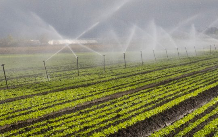From the Office of Public Affairs | http://www.news.ku.edu
Headlines
Study shows news organizations still lead in sharing difficult information on social media
LAWRENCE — As media organizations across the country fold and news deserts grow, it remains to be seen who will ask difficult questions traditionally posed by journalists. While social media provides an opportunity for community organizations and leaders to take that role, a new study co-written by a University of Kansas researcher shows that in the case of difficult conversations regarding racial disparities and the COVID-19 pandemic, news outlets still lead the way.
KU welcomes Ukrainian food anthropologist, historian as visiting professor
LAWRENCE — A historian from Lviv, Ukraine, with expertise in the cultural exchange and culinary traditions of Eastern Europe has joined the University of Kansas faculty for the 2024-25 calendar year as part of the Scholars at Risk Network. Ihor Lylo will deliver a public talk at 7 p.m. April 15 titled “Food as Power: Between Decolonization and Nationalism of the Gastronomic Culture.”
Full stories below.
————————————————————————
Contact: Mike Krings, KU News Service, 785-864-8860, [email protected], @MikeKrings
Study shows news organizations still lead in sharing difficult information on social media
LAWRENCE — As media organizations across the country fold and news deserts grow, it remains to be seen who will tell the tough stories and ask difficult questions traditionally posed by journalists.
Social media provides an opportunity for community organizations and leaders to take that role, but a new study shows that in the case of difficult conversations regarding racial disparities and the COVID-19 pandemic, news outlets still take the lead in sharing such information.
The pandemic saw pronounced health disparities and negative outcomes falling disproportionately on communities of color. That happened around the same time as the murder of George Floyd and resulting protests for racial justice across the country. Those concurrent events provided an opportunity to examine how organizations discussed a difficult topic, said Christopher Etheridge, assistant professor of journalism & mass communications at the University of Kansas.
“This raises some interesting questions like, ‘What civic conversations are taking place online as organizations become increasingly reliant on social media to communicate?’” said Etheridge, a contributor to the project. “If everyone has their own Facebook page to control the message, are the difficult conversations necessary to a healthy community taking place?”
Researchers from the Civic Infrastructure Lab at Michigan State University and colleagues conducted two studies to examine the question. They analyzed more than 1,250 Facebook posts made by civic organizations, including news outlets, nonprofits, community organizations, public libraries, universities and local public Facebook groups from March of 2020 to September 2021. They also interviewed 17 communications managers from the organizations about what they posted and the strategy behind those decisions.
Data showed that 14.5% of posts mentioned the pandemic and 2.5% mentioned racism and/or Black Lives Matter, though only .06 percent of posts from across the organizations mentioned racial or health disparities pertaining to COVID-19. Of those, nearly 70% were made by news organizations, followed by nonprofits at 29.7%, health organizations with about 5%, government officials at 1.7%, educational organizations with 1.2%, politicians at 1% and civic service organizations at .31%. Libraries and neighborhood groups made no such posts.
The post analysis and interviews were conducted within six communities in the Great Lakes region: Flint and Lansing, Michigan; Bemidji and Duluth, Minnesota; and Gary and South Bend, Indiana. The communities were chosen for a high variation of racial diversity of residents, number of local news outlets and metrics of economic equality.
“We didn’t see a ton of conversations about health disparities even among organizations where that might be a part of their mission,” Etheridge said. “We thought the summer of 2020 might be an opportunity for these organizations to raise topics connected to health and race, but we found people hesitant in part because of the perception that there is already so much negativity, trolling and unpleasant comments already out there.”
The paper, published in the Annals of the American Academy of Political and Social Science, was co-written by Ava Francesca Battocchio, Kjerstin Thorson, Dan Hiaeshutter-Rice, Marisa Smith, Hyesun Choung, Chuqing Dong and Moldir Moldagaliyeva of Michigan State University; Yingying Chen of Renmin University of China; Stephanie Edgerly of Northwestern University; and Kelley Cotter of Pennsylvania State University.
The researchers also conducted interviews with storytellers on how they decide the content to share via their social media channels. The communications managers indicated they were aware of racial health disparities and COVID-19, but outside of news organizations, they understood their role in creating content regarding race and health disparities in different ways. Interviewees said they were concerned about their organization’s reputation and that their financial well-being could be negatively affected if their reputation suffered from posting about controversial issues. They also indicated hesitancy to impugn the reputation of their community by implying social inequity was a problem there, the study found.
And while managers indicated they were aware of racial disparities in health outcomes, few respondents indicated they saw it as a problem in their own community, the study found.
Interviewees from news organizations said that they saw their role differently and that they had a responsibility to share information about disparities in health and injustice, even if it was uncomfortable or difficult to accept, the study found.
“Non-news organizations didn’t say, ‘We need to be leading public thinking on these topics,’” Etheridge said. “A lot of people were craving engagement but didn’t want to have conversations online that could turn nasty or negative. News organizations recognized that having tough conversations was part of their mission, shining light on these issues in a public way. So this leads us to wonder what happens if these news organizations go away or shrink in size.”
The pandemic coinciding with renewed attention to systemic racism in the wake of Floyd’s murder provided a unique opportunity to “stress test” local civic information infrastructure, the researchers wrote, and the findings validate the importance of local journalism to facilitate difficult, yet necessary conversations.
-30-
————————————————————————
The official university Twitter account has changed to @UnivOfKansas.
Refollow @KUNews for KU News Service stories, discoveries and experts.
————————————————————————
Contact: Wyatt Haywood, Department of Slavic, German & Eurasian Studies, [email protected]
KU welcomes Ukrainian food anthropologist, historian as visiting professor
LAWRENCE — An anthropologist and historian from Lviv, Ukraine, with expertise in the cultural exchange and culinary traditions of Eastern Europe has joined the University of Kansas for the 2024-25 calendar year.
The departments of Slavic, German & Eurasian Studies and History are supporting Ihor Lylo as a visiting assistant professor as part of the Scholars at Risk Network’s initiative to protect scholars in crisis.
As part of his appointment, Lylo will deliver a public talk titled “Food as Power: Between Decolonization and Nationalism of the Gastronomic Culture,” which will take place at 7 p.m. April 15 at the Hall Center for the Humanities Conference Hall, with an option for audiences to watch online.
The event will explore the cultural significance and influence of Eastern European gastronomic traditions, particularly on Ukrainian cuisine. Lylo argues that traditional gastronomic practices of social and religious groups play a crucial role in shaping collective memory. This poses a danger to totalitarian regimes that use food and supply security as a tool of terror or political propaganda.
During his time at KU, Lylo also teaches the SGES course REES 110: Understanding Russia and Eastern Europe as well as HIST 390/SLAV 379: Cultural Heritage of Ukraine while continuing his own research.
Lylo recently served as a visiting professor of history as part of the Scholar at Risk program at the University of California, San Diego. He was a researcher and educator at the King John III Palace Museum in Warsaw and held professorships at Jagiellonian University in Kraków, Poland, and the Ivan Franko National University in Lviv, Ukraine.
Lylo’s publications include the co-written “Lviv Cuisine” (in Ukrainian), published by Znak Krakow in 2023 and “UKRAINE: Food and History” (in English, French, Italian and German), published in 2021. He has written several travel guides of Ukraine.
Lylo’s appointment has been made possible through contributions from various university units, including the SGES and history departments, Office of Research, College of Liberal Arts & Sciences, the Hall Center, the Institute for Policy & Social Research and Institute for Global & International Engagement, as well as the Scholars at Risk Network.
-30-
————————————————————————
KU News Service
1450 Jayhawk Blvd.
Lawrence KS 66045
Phone: 785-864-3256
Fax: 785-864-3339
http://www.news.ku.edu
Erinn Barcomb-Peterson, director of news and media relations, [email protected]
Today’s News is a free service from the Office of Public Affairs




